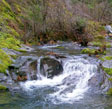Albion River Watershed Protection Association
Alliance for Democracy
Friends of the Gualala River
Public Citizen
Sierra Club, Redwood Chapter
December 13, 2002
Contacts:
Jim Jordan, 707-785-2549
Doug Hammerstrom, 707-884-1826
Jane Kelly, 510-663-0888
Nancy Price, 530-758-0726
Public Interest and Environmental Groups Decry Controversial Water Bag Scheme
California Coastal Commission Votes Friday to Protest Controversial Plan That Activists Testify Would Lead to Theft of Water
SAN FRANCISCO, Calif. – After hearing testimony from representatives of public interest and environmental organizations decrying a proposed project to transport and market bulk water from two North Coast rivers, the California Coastal Commission voted unanimously today to protest the project on the final day of its three-day meeting. The water bag scheme would suck water from the mouths of the Albion and Gualala Rivers to fill polyethylene bladders, each almost the size of three football fields. Tugboats would pull these to San Diego, where Alaska Water Exports, a part of the multinational corporation World Water SA, would sell the water to the city.
The groups cited environmental impacts, public trust violation and transnational corporate control issues as reasons to oppose the project. The Coastal Commission voted to file a protest with the State Water Resources Control Board (SWRCB), where the project’s applications are pending.
“The scheme will desecrate what many of us view as a sacred space,” said Jim Jordan with Friends of the Gualala River. “For seven months or more each year, 24 hours a day, ocean-going tugs and tenders maneuvering ungainly bags the size of football fields would dominate these vistas.”
Environmental damage to the fragile ecosystems at the rivers’ mouths is of great concern to many residents of the area. “We have been fighting for our river’s survival for years. Only recently have the rivers been recovering from the muddy mess created by upstream clear-cutting. Now this company wants to steal the water and again threaten the fish nurseries we have nurtured back to life,” said Doug Hammerstrom of AGUA, a coalition of organizations working to protect the Albion and Gualala Rivers. “We won’t allow it.”
International trade agreements, like the North America Free Trade Agreement (NAFTA), could threaten every free-flowing river on the northern coast of California, and even Oregon and Washington, if this sale of bulk water is permitted, warned Jane Kelly, director of Public Citizen’s California office, a nonprofit public interest organization.
“Once Alaska Water Exports gets control of this resource, we can kiss our free-flowing rivers goodbye,” she said. “Agreements like NAFTA would make it possible for international corporations to exercise more and more control over our water.”
NAFTA’s Chapter 11 grants expansive rights and privileges to corporations operating in the United States, Canada and Mexico, allowing investors to sue governments for policies that that they feel violate their rights under NAFTA.
Nancy Price of the Alliance for Democracy, a public interest organization, told the Commission how the non-discrimination provision in agreements like NAFTA mean that once a domestic bulk water source, including river mouths, is tapped by a company, then all of that source must be available, regardless of government regulations to the contrary, “no matter how fairly conceived and applied.” She advocated for “the application of the public trust doctrine which protects water as a common resource to be managed for all the citizens of California. It’s in our state constitution.”
The project does not make economic sense either, said Don Kemp, a member of Friends of the Gualala River. “The proposals fail to meet or even permit anyone else to meet minimum standards of due diligence,” he testified. “What diligence that is possible so far indicates that the project is a waste of resources and more costly than desalination, conservation and recycling.”
The Coastal Commission will file a 36-page protest with the SWRCB. Among other things, the protest states that the Coastal Commission will require its own permitting process, in addition to any project approval by the SWRCB. The 60-day comment period for protesting the project applications (one for each river) is currently closed but is expected to re-open as soon as the SWRCB re-issues public notices. The SWRCB had originally opened the 60-day notice period on Sept. 13, 2002, but closed it in October due to the failure of Alaska Water Exports to publish the required newspaper notices.
#####
 Friends of Gualala River Protecting the Gualala River watershed and the species living within it
Friends of Gualala River Protecting the Gualala River watershed and the species living within it
